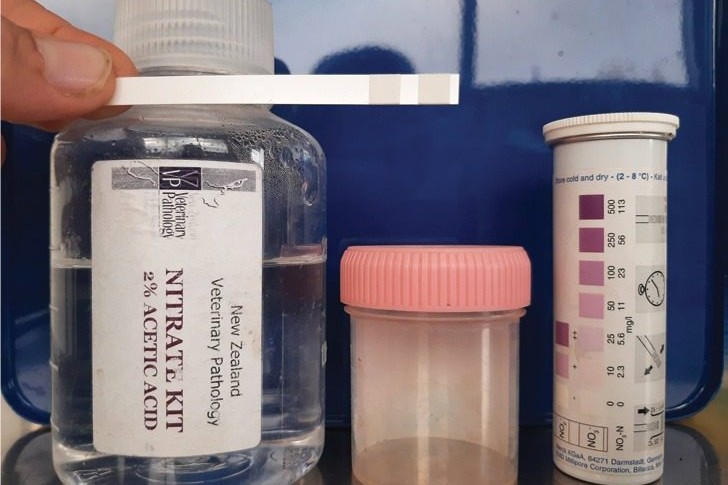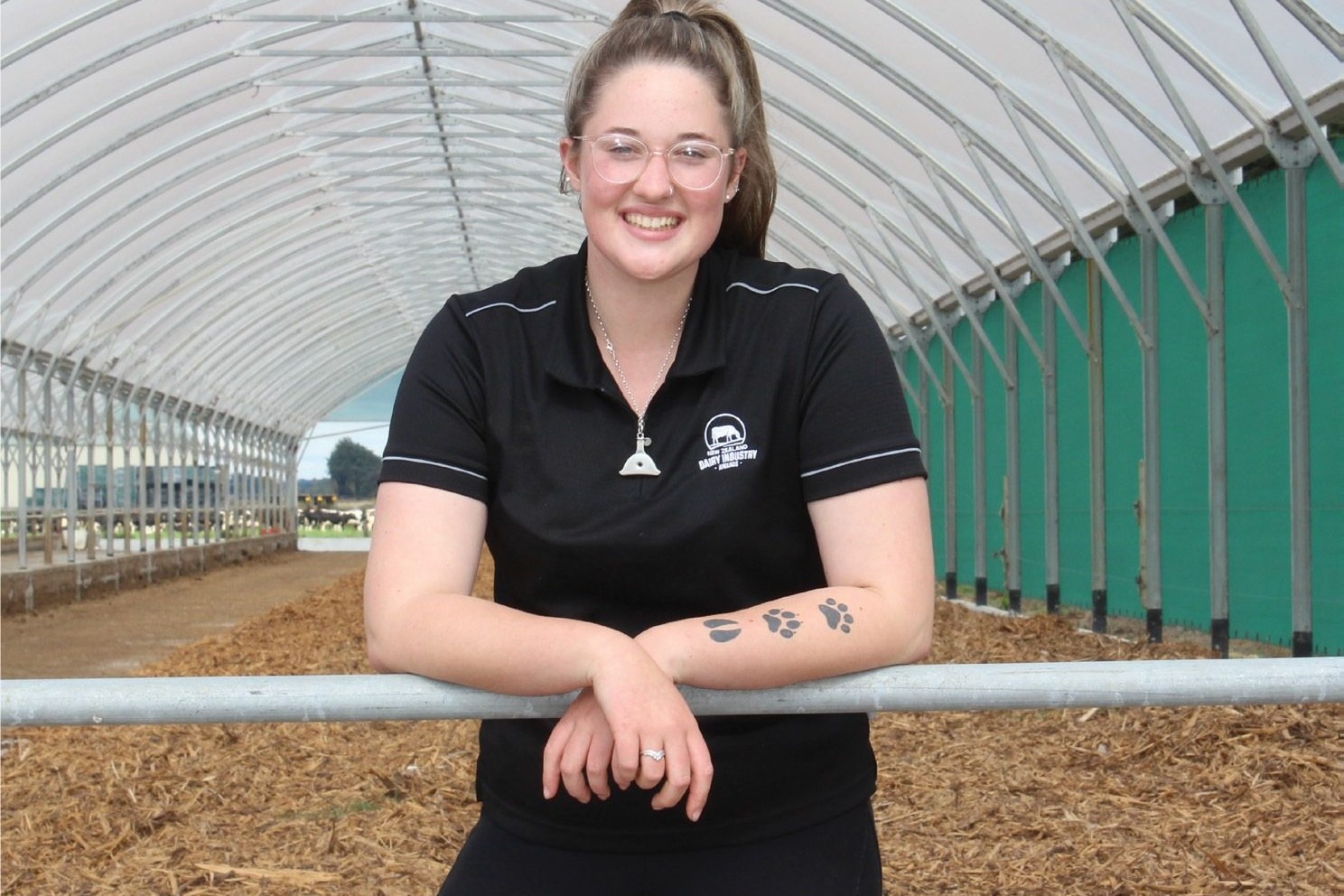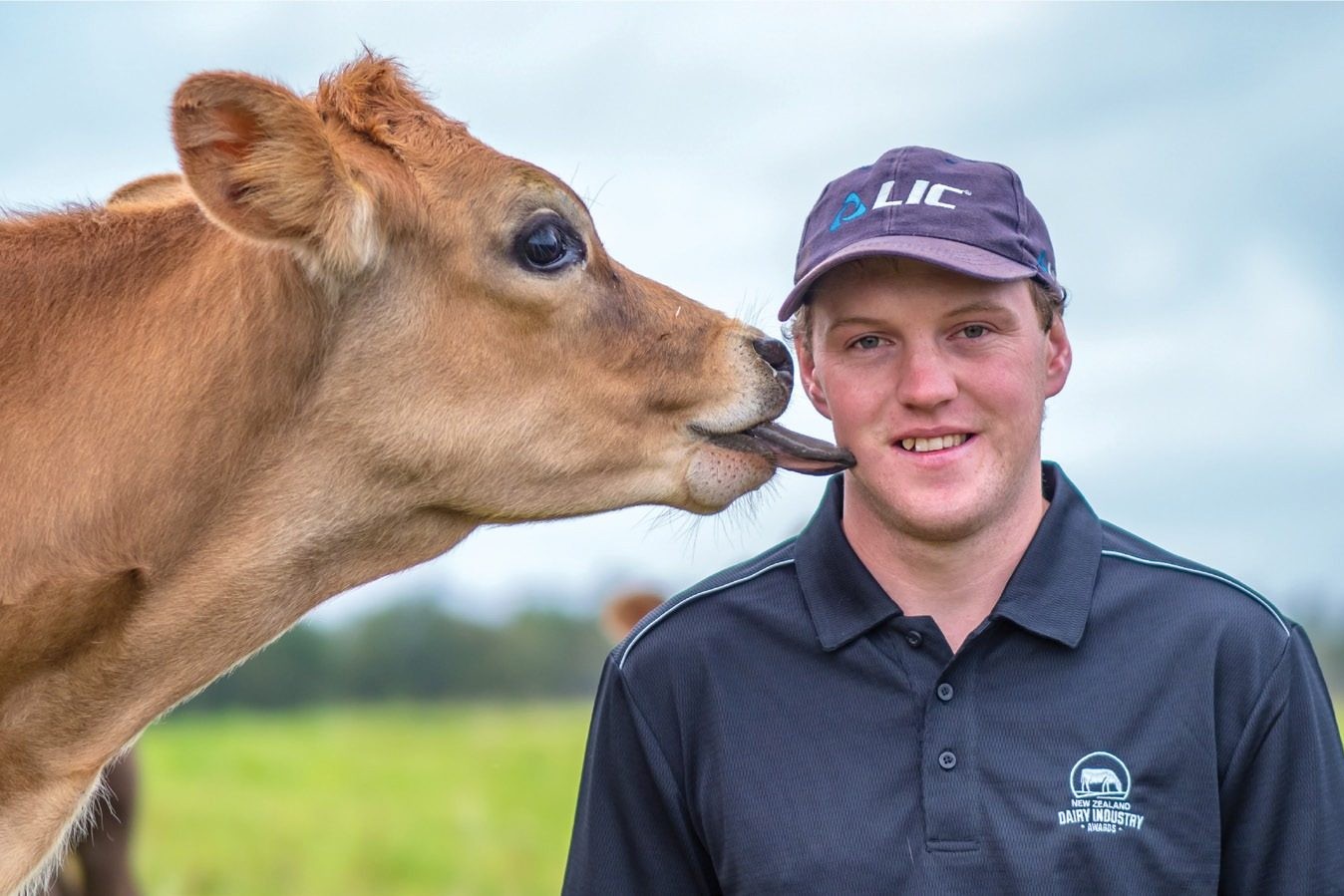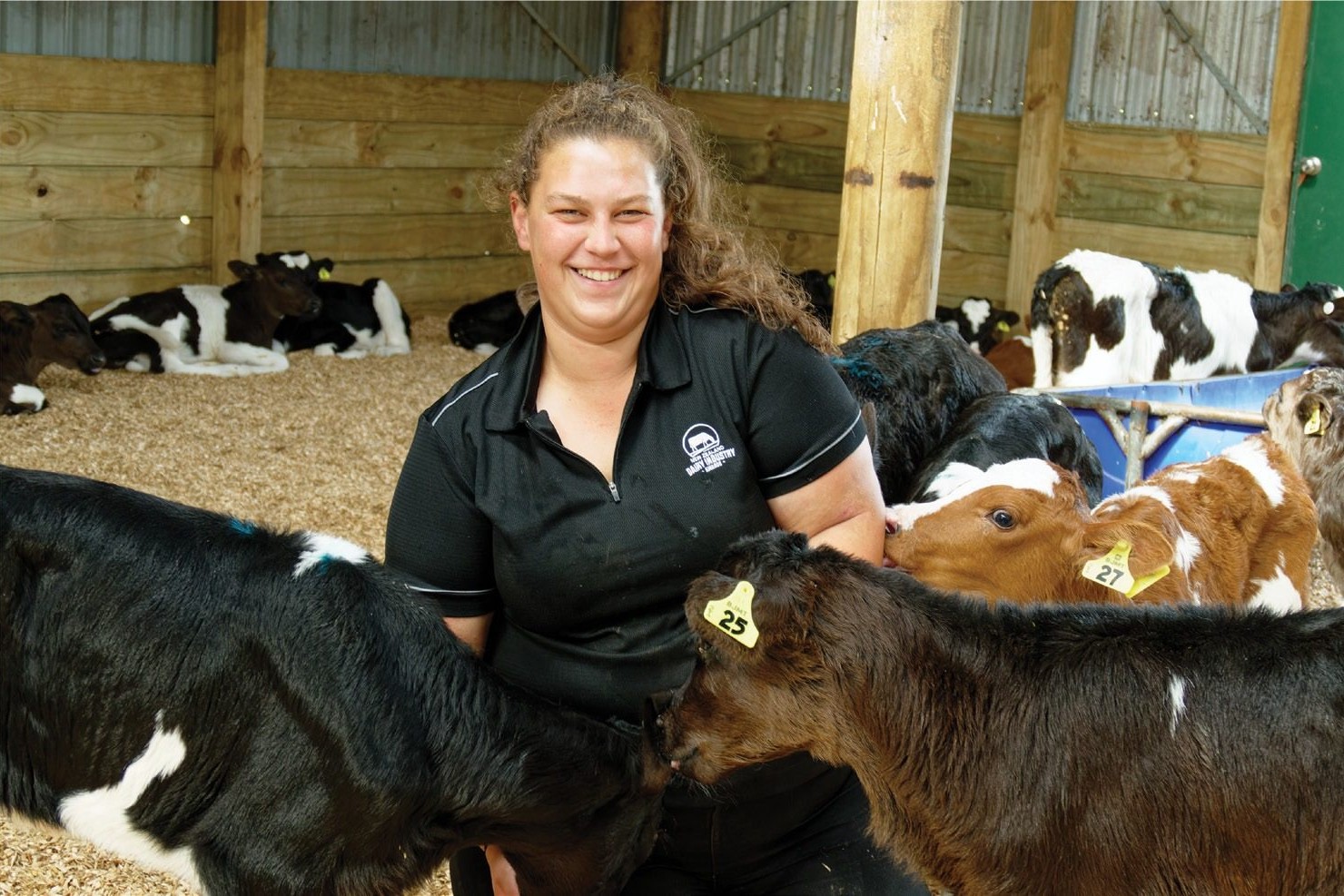Words by Anne Lee, photo by Johnny Houston
Dinuka and Nadeeka Gamage have made the absolute most of every opportunity dairying has provided since they arrived in New Zealand from Sri Lanka 13 years ago.
The couple are this year’s Canterbury/North Otago Sharefarmers of the Year and have hoisted themselves up the progression ladder through hard work, eagerness to learn and by fostering great relationships.
They are contract milkers for Dairy Holdings Ltd (DHL) near Ealing in mid-Canterbury on a 245ha, 980-cow farm and are well on their way to their next goal of sharemilking 600 cows.
The couple moved to NZ in 2008 to take up a dairying job knowing the sector here offered scope for growth.
Dinuka had completed an agricultural engineering national diploma and postgraduate marketing diploma and had worked selling veterinary medicine. But he knew that farming and being out on the land was where he really wanted to be.
Their first job was as assistant herd manager for Wayne and Suellen Pamment in Kaikoura milking 850-cows with the next step moving up from assistant herd manager to herd manager, second in charge (2IC) and then farm manager over eight years for Mark and Penny Fleming in Culverden.
A planning wheel for success
In 2014 they completed a DairyNZ BizStart programme and as part of that drew up a planning wheel.
It’s well-worn but they can proudly show they achieved each and every medium-term goal.
One of those goals was to go contract milking – something they ticked off in 2017, another was to buy a house – they ticked that off in 2019.
Another goal was to carry on with study – and in 2019 Dinuka completed a New Zealand Diploma in Agribusiness Management. He’s also completed PrimaryITO Dairy Farm Production Management Level 5.
In addition, the couple had a goal to enter the Dairy Industry Awards. In 2016, Dinuka placed third in the Canterbury/North Otago farm manager competition.
“It was a pivotal moment,” Nadeeka says.
It showed they were on the right track, allowed them to meet other like minded farmers and create new networks.
One of those new networks was with DHL supervisor Mick O’Connor and in the 2017-18 season they joined DHL as contract milkers on their current farm.
Nadeeka says they revisit that planning wheel and update it and the next goal is to own 250 cows by the end of this season without debt and continue to grow stock numbers so they have their own 600-cow herd by 2023.
Based on their track record, they’ll nail it.
Dinuka says the flexibility DHL has built into its contract agreements and the opportunity that gives to grow stock numbers, lease cows back to the business and sell calves from those cows is all making a big difference to their equity growth and ability to tick off their goals.
“We have a hybrid type contract where we get a higher contract milking payment but we also share in 20% of some costs that a contract milking might not usually pay for and we include our grazing costs for our young stock.
“That makes our costs look high compared to other contract milkers but we are making an income from our stock and growing our stock numbers on top of that contract.”
Getting the financials right
Their clear understanding and management of their finances earned them the Westpac Business Performance Award.
“When we came here, we had 14 cows but every year we’re able to rear calves and grow our numbers with the young stock reared with other DHL young stock because all of the company’s herds are closed now to protect from M bovis.
“We pay a grazing fee but it’s a bit cheaper than what we’d pay elsewhere,” Dinuka says.
The company also shares the good times with its contract milkers, adding another $10,000 to their milk cheque if payout goes over $6/kg milksolids (MS).
“DHL pays us every month so we’re getting a 12-month cashflow – not like some contracts where the contract milkers don’t get anything over the winter,” Dinuka says.
They manage their accounts through Xero and Figured farm software.
“The agribusiness diploma really helped when it came to financial skills so I do all our own GST and cashflow budgets,” he says.
Human resources was also part of the diploma and has helped with the practical aspects of managing a team as well as compliance.
The couple won the Federated Farmers Leadership Award and say they get a lot of satisfaction out of mentoring their team members and sharing what they’ve learned about progression.
“We love showing them the pathway to growing their business and then step by step helping them grow,” Dinuka says.
All three of their permanent, full-time team are Sri Lankan.
“We encourage them to speak English onfarm so they build that skill and it gives them a better chance of progressing.
“It’s important because they may need to talk to contractors and other people from the company (DHL).
“Language barriers are one of the key things stopping migrant staff from growing and progressing.
“We know what it’s like to be a new immigrant, to have family back home and they know that which means they feel they can talk to us freely.
“We keep a good watch on them,” he says.
Nadeeka says new staff go through a skills assessment and a training plan is drawn up for them.
“We help them set goals and then we review how they are going during the year.”
Last year the couple became accredited as employers of choice through Coach Approach.
Walking the talk onfarm
The farm runs a nil input system, buying in feed only where something has gone wrong with the season.
The stocking rate is set to closely match home-grown pasture feed supply.
At the peak growth period, through the later-spring, any surplus is cut and ensiled so it can be fed out during any deficits.
It reduces costs and means the focus is very much on managing pasture and achieving a sound profit rather than being too focused on the vat.
This season 200 bales of balage have been made and no supplement bought in.
Pasture walks are carried out every week without fail by either Dinuka or his 2IC with covers put into AgriNet software and daily allocations planned out.
Watching growth rates, monitoring pre-grazing covers and post-grazing residuals and monitoring pasture quality is going on throughout the day, every day.
“We want quality to be high right through the season and we’re looking to be grazing paddocks as they go to the 2.5 to three leaf stage.”
Dinuka runs two herds – one for the younger cows and one for the older animals.
It reduces the competition from older, bossier cows and means the younger herd can be given priority.
He uses a 24-hour break system rather than 12-hourly and will put cows back into a paddock to clean up and get to residual if needed.
Cows are independently body condition scored (BCS) four times a year.
That information along with calving dates is used to set up the autumn feed and dry-off plans.
Once-a-day (OAD) milking and drying off are used to ensure both cows and pastures reach seasonal targets.
All empty cows are gone from the farm by the end of March.
Dinuka says setting up for next season starts now and there’s never any intention to bring in feed to keep cows milking longer no matter what the payout is.
“If we had a feed shortage because something had gone wrong, we would buy some in but it’s not on our plan for a normal year,” he says.
Cows are wintered off and when they return, from calving to balance date, the spring rotation planner is strictly adhered to.
From the balance date, he runs a 24-day round to match pasture growth and as they head into autumn the round begins to be extended.
They’ve expanded the effluent area this past season to 70ha and using Ravensdown’s HawkEye programme have set urea applications so the effluent area gets less nitrogen.
The last urea application is in April and in December and January applications are skipped given poor response rates during times when soil temperatures are high.
Irrigation applications are based on soil moisture monitoring.
Dinuka says a focus on hitting BCS targets and managing cows through the 10-week mating period (six-weeks artificial insemination (AI) and four weeks bulls) has led to the 74% six-week in-calf rate – up from 70% and 72% in the previous seasons.
They use no intervention but focus on monitoring pre-mating heats from 35 days prior to the planned start of mating.
Any cows not cycling are put in a separate herd and fed ad-lib ahead of the other cows and put on OAD milking.
The whole herd is metrichecked before mating and metricured as required.
Bulls are rotated every second day.
The couple’s business is called Luckcow Dairy Ltd but goal setting and determination have played a much greater role in their success to date than luck.
In 2018, they proudly gained NZ citizenship along with their children Anuhas, now 14 and Thejan, 10. No doubt they’ll continue to grab every opportunity with both hands and are testament to what can be achieved.
Canterbury/ North Otago Share Farmer Merit Awards:
DairyNZ Human Resources Award – Brigitte and Braden Barnes
Ecolab Farm Dairy Hygiene Award – Daminda Gajamange
Federated Farmers Leadership Award – Dinuka & Nadeeka Gamage
Honda Farm Safety, Health & Biosecurity Award – Brigitte and Braden Barnes
LIC Recording and Productivity Award – Brigitte and Braden Barnes
Meridian Farm Environment Award – Daniel and Laura Joho
Ravensdown Pasture Performance Award – Daniel and Laura Joho
Westpac Business Performance Award – Dinuka & Nadeeka Gamage





